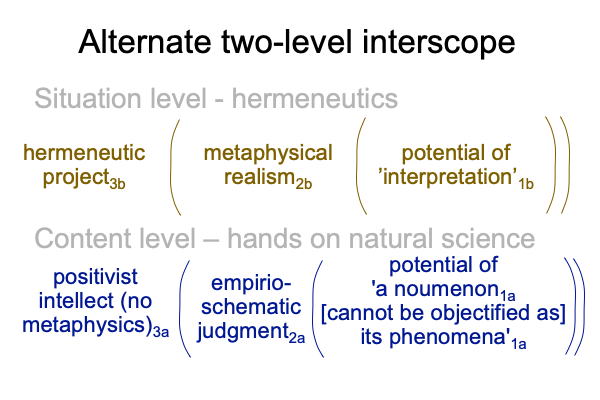0019 Before continuing, I note that the relational structures in the prior blogs are presented in A Primer on the Category-Based Nested Form and A Primer on Sensible and Social Construction. A two-level interscope characterizes sensible construction. Sensible construction presumes a functioning perspective level, even though that perspective level may not be articulated.
0020 Now, I move on to test two, the latent exclusion of hermeneutics by Husserl’s paradigm.
What would a situation-level hermeneutic look like?
0021 Here is my guess, based on the essay.
A hermeneutic paradigm3b brings metaphysical realism2b into relation with the possibilities inherent in interpretation1b.

0022 This arrangement is not permitted.
Obviously, the actuality2 of this situation levelb, metaphysical realism2b, grates against the positivist intellect3a, because it2b defies its3a rule against metaphysics. Less obviously, a difficulty originates from the reality that hermeneutics3b does not share the same perspective as the positivist intellect3a.
Where is the perspective level?
It is latent.
The term, “latent”, qualifies, because the perspective level of the Positivist’s judgment is not articulated. It2c is just there.
It2c is simply given.
0023 What does this further imply?
Perceptive phenomenologists, such as the Catholic Jean-Luc Marion, note this lack of perspective and wonder what to do with it. Could hermeneutics apply? If so, then a normal context of hermeneutics3c could virtually contextualize Husserl’s paradigm3b, as Husserl’s project3b virtually situates the positivist intellect3a.
Would a perspective-level hermeneutics3c condone the rule of the positivist intellect3a?
I do not think so.
